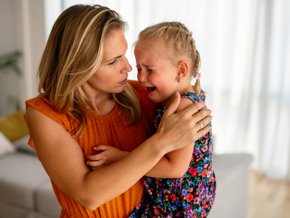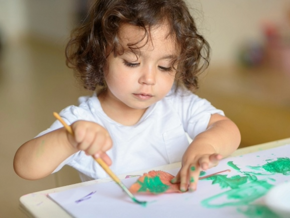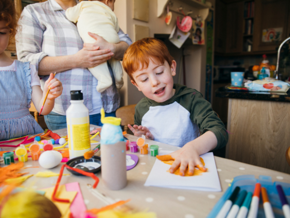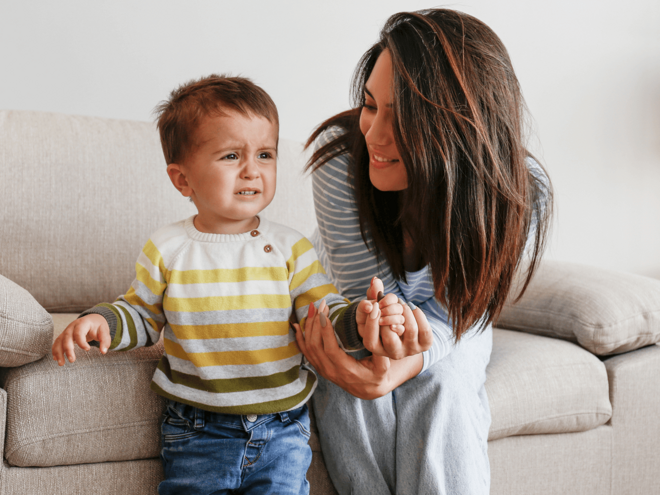
What is emotional regulation and how does it impact children?
Emotional regulation in childhood is all about how we manage our feelings and reactions to different situations. For little ones, this means learning to recognise their emotions, understand what they feel, and respond in a healthy way. It’s a crucial skill that helps kids navigate their social world, make friends, and cope with challenges. When children develop strong emotional regulation skills, they are better equipped to handle stress and bounce back from setbacks. Emotional regulation skills are also closely linked to other areas of development, such as cognitive and behavioural self-regulation.
Cognitive self-regulation: Self-regulation for preschoolers is about controlling their thoughts and attention. For instance, a child who can focus on a task despite distractions is exercising emotional control. It helps them:
- Think before acting;
- Solve problems effectively;
- Plan and set goals.
Behavioural self-regulation: This is about managing actions and reactions. It includes:
- Waiting for their turn during playtime;
- Following rules in games;
- Expressing frustration in appropriate ways.
As your child grows, developing these self-regulation skills becomes essential for their overall well-being. It’s important to remember that building emotional regulation skills is a lifelong journey. It starts in toddlerhood and continues through childhood, adolescence, and even into adulthood. So, while it may feel overwhelming at times, with your support and guidance, your little one can learn to navigate their emotions, leading to healthier relationships and better coping mechanisms throughout life.
When do emotional regulation skills begin to develop in children and preschoolers?
Emotional regulation skills begin to take shape early in a child’s life and evolve significantly as they grow. In infancy, babies express their emotions primarily through crying and cooing. They rely on caregivers to help them understand and respond to their feelings, laying the foundation for future emotional control.
As children transition into the toddler stage, typically around ages one to three, they start to assert their independence, which can lead to some challenging moments. This is often referred to as the "terrible twos," where tantrums can become a common occurrence as toddlers struggle to express their emotions and desires.
Moving into the preschool years, from ages three to five, kids develop their emotional regulation skills further. Playing with peers helps them learn how to share, take turns, and express their feelings in social situations. This is also when they start interacting more with new people and communicating in public spaces, helping them to practice and refine their emotional control.
Preschoolers begin to identify and label their emotions and understand that others have feelings too, which is an important step towards empathy. They begin to develop strategies for managing their emotions, such as taking deep breaths or using words to express how they feel. This period is incredibly formative, as these skills will serve as building blocks for their interactions in primary school and beyond.
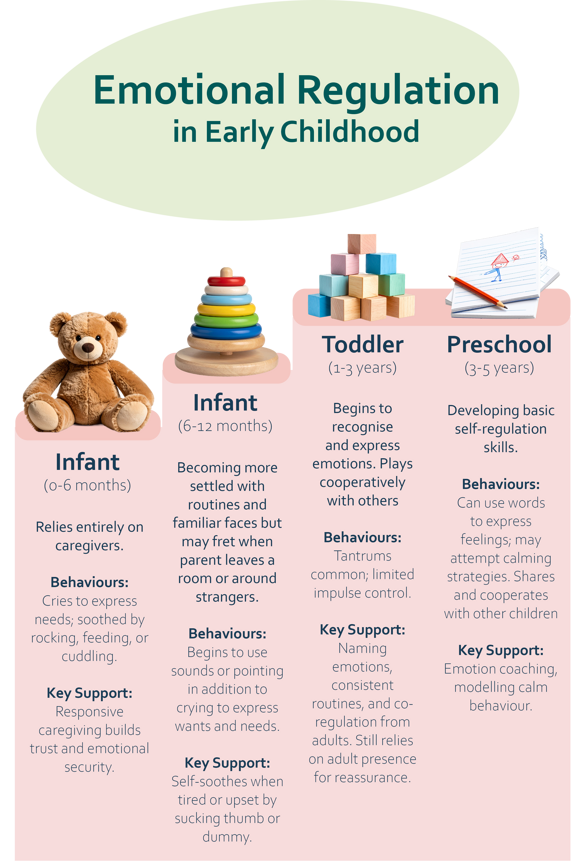
Why is self-regulation important for preschoolers?
Preschoolers are at a stage where they are experiencing a variety of new environments and situations that can challenge their emotional regulation skills. But these experiences are crucial for their development. As they step into the world beyond home, preschoolers face situations that may evoke strong feelings, making it essential for them to practice self-regulation. Here are some common environments and situations that can test a preschooler's self-regulation skills:
- Attending preschool or daycare;
- Going to the movies or other public events;
- Visiting the grocery store;
- Spending time with a babysitter or family friend;
- Playing with friends at a park or playdate;
- Participating in group activities or classes, like sports or art.
By teaching your child helpful emotional regulation skills and strategies during these formative years, you are equipping them with the tools they need to grow into emotionally and socially resilient individuals. Skills like deep breathing, using words to express feelings, and recognising when they need a break can empower children to manage their emotions effectively, leading to confidence in their abilities to handle various situations.
How self-regulation in preschoolers helps them in adulthood
The benefits of developing emotional regulation in childhood can extend far into adulthood, including:
- Effective communication: Being able to express feelings and thoughts clearly helps in building strong relationships.
- Problem-solving skills: Children learn to assess situations and come up with constructive solutions to challenges.
- Stress management: Developing coping strategies early on helps individuals handle stress in healthier ways throughout life.
- Empathy and understanding: Recognising and considering the emotions of others forms deeper connections and social awareness.
- Goal setting and achievement: Self-regulation encourages the ability to set personal goals and work towards achieving them, promoting success in various areas of life.
How can parents grow emotional regulation skills in their preschoolers?
Parents, educators, and other family members all play a vital role in shaping a child's capacity for emotional regulation. As the primary role models, parents often serve as the strongest influence, so demonstrating healthy emotional responses and coping strategies will help guide their little ones through the ups and downs of life. This learning through observing encourages emotional growth and resilience as they navigate different social dynamics and expectations.
Emotional regulation skills and strategies for preschool aged children
Some common examples of ways to guide preschoolers in growing their capacity to remain calm, communicate their emotions, and empathise with others’ emotions includes:
- Discussing emotions in stories: Use books and movies as tools to explore emotions. Talk about the feelings characters display and ask your child how they think those characters might be feeling in different situations. This not only helps children identify emotions but also encourages empathy as they consider others’ perspectives.
- Modelling emotional awareness: Show your child how you recognise and express your own emotions. For instance, when you feel frustrated or happy, verbalise it. Say things like, “I’m feeling a bit stressed right now, so I’m going to take a deep breath.” This teaches children to acknowledge their feelings and understand that it’s okay to express them.
- Deep breathing and mindfulness activities: Introduce simple activities for emotional regulation like deep breathing exercises, meditation or other mindfulness practices. You can practice together by taking slow deep breaths, counting to four as you inhale and exhale. This can help children learn to calm themselves when they feel overwhelmed.
- Yoga and Movement: Yoga and movement are great activities for emotional regulation in childhood. These activities not only promote relaxation but also help children develop body awareness and emotional control, which are essential for emotional regulation.
- Arts and crafts activities: Engage your child in arts and crafts as a way to express their feelings creatively. Encourage them to draw or make collages that represent their emotions. Ask them to explain their artwork, which can help them articulate how they feel and provide a safe outlet for their emotions.
What are some challenges children face in learning emotional control and management?
Building emotional regulation in your child is a journey, and it won’t always be a smooth one, no matter how many strategies you try. It’s essential for parents to be in-tune with their own emotions as they guide their children through this process. Mum guilt is real so remember to be kind to yourself. Progress may not always meet your expectations, and that’s perfectly okay. Several key factors can impede a child’s capacity for emotional control, including:
- Tiredness: Lack of sleep can make it difficult for children to manage their emotions effectively.
- Illness: Physical discomfort or sickness can heighten irritability and frustration.
- Neurodivergence and additional needs: Children with conditions such as autism may face unique challenges in emotional regulation.
- Changes in routine: Sudden shifts in daily schedules or environments can be unsettling for some young children.
- Stressful life events: Experiences such as moving house, family changes, or loss can impact a child’s emotional state.
It’s completely normal for these factors to affect emotional regulation. However, if you believe your child is struggling more than expected, it may be worth speaking to your local GP or health professional for further support.
Signs you may need to speak to a medical professional about your child’s emotional regulation
Additional underlying factors could be having an impact on your child’s emotional regulation that you may not be aware of. If you notice concerning behaviours, it may be worth seeking some guidance from your healthcare professional. Some signs that may indicate the need for additional support include:
- Your child throws more tantrums or their emotional outbursts are intense and last longer than what is typical for their age;
- They aren’t responding to emotional regulation strategies you’ve tried;
- They seem excessively withdrawn or anxious in social situations;
- They frequently express feelings of sadness or frustration without clear triggers.
By paying attention to these signs, you can get the support they need early. Remember, seeking help is a sign of strength and commitment to your child’s well-being.
Frequently asked questions about emotional regulation in preschoolers
What is emotional regulation?
Emotional regulation is the ability to recognise, understand, and manage emotions effectively. It involves being aware of your feelings and responding appropriately, which is essential for coping with stress, navigating social interactions, and making informed decisions. Developing these skills contributes significantly to overall emotional well-being.
How do you teach your kids to regulate their emotions?
Emotional regulation in preschoolers can start with you modelling emotional awareness and discussing your feelings. Create a safe space for open conversations and use books to highlight emotions. Practice calming techniques, such as deep breathing, and engage in role-playing games to help them identify and manage their feelings. Being able to express themselves and cope with overwhelming emotions effectively is an important skill your little one will need for life.
What are the benefits of emotional regulation in children?
Emotional regulation in childhood has numerous benefits, including improved relationships with peers and adults. It enhances problem-solving skills, allowing children to think clearly and make better choices. Emotionally regulated children also exhibit greater resilience, enabling them to cope with stress and recover from setbacks. Additionally, these skills help children develop constructive coping mechanisms, reduces the risk of unhealthy emotional responses and contributes to academic success in later life.
What are the 4 R's of emotional regulation?
The 4 R's of emotional regulation refer to Recognising emotions as they arise; Reflecting on the reasons behind these feelings and their impact on behaviour; Regulating emotions using strategies like deep breathing; and finally, Responding constructively, expressing emotions respectfully toward oneself and others.
Sources:
- Raising Children’s Website. Accessed at Self-regulation in children & teenagers | Raising Children
- Australian Children’s Education & Care Quality Authority Website. Accessed at QA5_Supporting_children_to_regulate_their_own_behaviour.pdf
- Developmental milestones and the Early Years Learning Framework and the National Quality Standards. Accessed at DevelopmentalMilestonesEYLFandNQS.pdf

